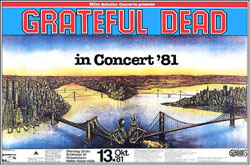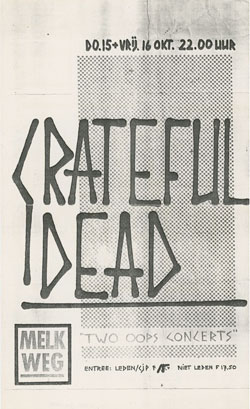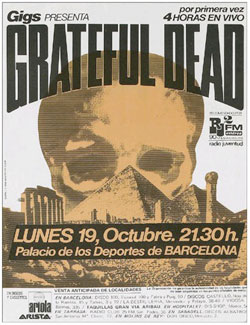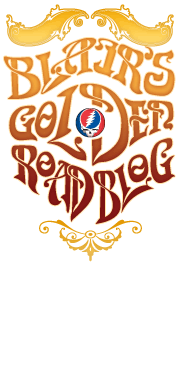By Blair Jackson
I've long wondered why I almost never hear anyone talk about the Dead's fall 1981 tour of Europe. After all, 1981 was a generally strong year for the band. Brent had fully settled in by then, and though there were no new songs introduced, the best from 1980's Go to Heaven—“Feel Like a Stranger,” “Alabama Getaway,” “Althea” and the combo of “Lost Sailor” and “Saint of Circumstance”—had matured nicely. Substance issues notwithstanding, Garcia played remarkably well all year.
It's probably not fair to use the uniformly magnificent Europe '72 tour as a point of comparison, but the Dead's other Europe jaunts were pretty darn good, too. The short tour in '74 produced the superb Dick's Picks Vol. 7 from the Alexandra Palace in London, as well as hot shows in Paris and Dijon. And though none of the '90 Europe tour with Bruce and Vince has been released, there were a number of excellent shows that have been widely traded. That was also the only Dead tour of Europe that had a large number of Americans from the U.S. following it from city to city, so there is an abundance of stories about the shows that have been passed around. But fall '81? Not so much.
The fall tour was actually the Dead's second trek across the pond in 1981. In late April, they bopped over for five shows—four at the intimate Rainbow Theatre in London (where their '72 tour was supposed to start, but didn't), and the last an appearance on the popular TV show Rockpalast (which was shown in large parts of Europe) at the Grugahalle in Essen, Germany. The Essen stop was the reason the April tour happened at all—it was a de facto promo stop for the band, to lay the groundwork and build excitement for a larger tour of Europe in October '81.
Bootleg copies of the Rockpalast show have been in circulation for many years, but unfortunately it has not found its way to a formal release—despite the fact that DVD purveyors Eagle Vision have been putting out excellent historic Rockpalast shows (Little Feat '77!) for quite a while. The Dead show is most famous for featuring Pete Townshend's interesting, if somewhat uncomfortable, appearance during “Not Fade Away” and “Wharf Rat” during the second set, not to mention the Flying Karamazov Brothers juggling troupe creating all sorts of mayhem during the drum solo.

This poster for the Dead's concert in Russelsheim used Dennis Larkins' artwork for the band's just-released Dead Set album.
But I was curious about the fall '81 Europe tour, which began in Edinburgh, Scotland, on Sept. 30, returned to the Rainbow in London for four shows the first week of October, and then moved on to Copenhagen, three cities in Germany—Bremen, Munich and Russelsheim—Amsterdam, Paris and Barcelona. So, over the past month, I listened to every show, all the way through, in order. I figured there must be a few gems in there, some under-the-radar shows that would have to be released some day.
The good news is that musically this was a fantastic tour! The band played with tons of energy and imagination. I can honestly say there's not a true clunker show in the bunch, and a few would rate among the best shows of '81. The bad news—and it's very bad news indeed—can be summed up in just four words: The soundboard tapes suck!
The problem surfaced in the SBD recording of the first show, from Edinburgh. Jerry, Brent, Mickey and Bill sound great, their parts completely clear. The vocals, too, are sharp, if mixed way too high. But wait a second, the Dead weren't a quartet in the fall of '81, were they? Because those four guys are all you can hear; Phil and Bob are missing from the mix! OK, a few times you might notice a little thppp, thppp bass coming through on a quiet passage, and there are points where you can almost imagine that Bob is, if not onstage with the others, perhaps playing along in a room backstage or down the street. Talk about frustrating! Jerry could be (and usually was) shredding, but it doesn't sound whole. It doesn't feel right.
Unfortunately, most of the tour tapes suffer from the same malaise to different degrees—not enough Bob and Phil. Anytime either of them poke through decently for a song or two it's a revelation and you can fully grok how well the band is playing. But those stretches are rare and even at their best are not up to the mix standards we've come to expect from the Dead. This was driven home to me any time I would play a well-mixed show from any other era after listening to one of the Europe '81 shows—“That's what the band is supposed to sound like!”
Why did this happen? And why are some other tapes from '81 inexcusably Weir-lite? If you listen to audience recordings of many of these shows (as I did), the instruments and vocals are all audible and seem to be well balanced (alas, Phil is rarely prominent enough for my taste on many audience tapes, but at least he's there). But for some reason, when the recordings were made (by mixer Dan Healy, I presume?), evidently no one bothered to monitor them and make sure what was going on tape reflected what was being heard in the hall. By the last couple of shows—Paris and Barcelona—things are considerably better sound-wise than the beginning of the tour, but still subpar in the grand scheme of Dead tapes.
Ironically, the best-sounding tapes of the entire tour are from the famous “Oops!” shows in Amsterdam, Oct. 15 and 16. Following the 10/13 show in Russelsheim, the band had originally been scheduled to play a pair of shows in the south of France, but they were rained out, so instead they flew to Amsterdam and played two nights at the Melkweg club (capacity around 500) using rented instruments! The second of the two shows fell on Bob's 34th birthday and is an absolute must-hear.
It starts with an eight-song acoustic set very much like the ones they played in the fall of '80 at the Warfield Theatre in SF and Radio City Music Hall in NYC. The second set became legendary instantly when the opening “Playing in the Band” eventually meandered into the '60s garage-rock classic “Hully Gully,” and later offered up surprisingly confident versions of “Gloria” (possibly the first since the mid-'60s) and “Lovelight,” which they had not played since Pigpen died. The rented guitars give the music a slightly different sound in places, but it's still Grateful Dead through and through. The set also contains fine versions of “The Wheel,” “Black Peter,” “Goin' Down the Road” and a couple of others. The two sets would fit neatly on two discs (nudge, nudge).
Now, I know I've devoted much of the verbiage above trashing the sound quality of the soundboard tapes, but I still thoroughly enjoyed listening to the shows, and you might, too. According to Volume II of The Deadhead's Taping Compendium, audience tapes exist for every show on the tour, but not all are represented on Archive.org, so if you're looking for alternatives to the worst SBDs, you may have to dig a little to find them.

Poster for hastily arranged Amsterdam shows.
Looking at the set lists, there isn't much to differentiate the Europe shows from most others in the '79-'82 period. But the playing is uniformly strong from the beginning of the tour to the end, and even songs you've heard a million times have life to them. Jerry is on fire and his voice still has some of that '70s sweetness, which dissipated more each year as the '80s progressed. Brent, too, was singing more than growling in those days, and I liked that he was still employing more synth textures than he did later. The “big” songs and combos never disappoint, and Jerry's ballads are stunning. There is also a little carryover from the 1980 acoustic sets, with electric versions of “On the Road Again” and “To Lay Me Down” cropping up here and there. “Lost Sailor” > “Saint” turns up in most shows, but there isn't a lame version in the bunch. The drum solos are exciting and varied, often featuring mega-duels as well as softer passages dominated by the tar (the legacy of Egypt '78).
Some highlights to look for:
If the four Rainbow shows (10/2,3,4,6) existed in acceptable-quality soundboards, they would make a killer box, because the entire range of the '81 Dead is very well-represented. On 10/2, there's a strong “Playing” >”Shakedown” > “Bertha” to open the second set. 10/3 has a first-set-ending “China Cat” > “I Know You Rider,” “Feel Like a Stranger” > “Franklin's Tower” to open the second set and a powerful “Morning Dew” out of “Not Fade Away.” 10/4 has one of the tour's best takes on “Let It Grow,” plus a long and flowing “Scarlet” > “Fire” and a “Spanish jam” going into “The Other One.” The 10/6 show was one of just a couple from the tour that I used to own on tape and it's quite inspired, boasting an 11-song first set that opens with “Shakedown Street,” and a second set that includes the rarely played “High Time,” a gnarly and abstract quotation from “Blues for Allah” during “space” (Egyptian leader Anwar Sadat had been assassinated earlier in the day), and then a rather unusual sequence of “The Wheel” > “Sugar Magnolia” > “Stella Blue” > “Good Lovin',” followed by an encore of “Sunshine Daydream” > “Brokedown Palace.”
The 10/8 Copenhagen show isn't quite up to the Rainbow concerts, but contains a strong pre-“drums”: “Scarlet” >”Fire,” “Playing” > “Terrapin.” The 10/10 Bremen concert features my favorite first set of the tour, with wicked turns on “Shakedown,” an awe-inspiring “Bird Song” and lightning “Let It Grow.” On 10/11, Jerry and Bob hopped over to Amsterdam and played an impromptu seven-song 35-minute acoustic set at the Melkweg which is fun, but not earthshaking. The following night in Munich (10/12) has another long, diverse and well-played first set (ending with “China” > “Rider”) and a second set that probably looks motley on paper, but which goes to some very cool spaces, particularly in the stretch that includes “Ship of Fools” > “Estimated Prophet” > “Goin' Down the Road.” There's another out-there “Bird Song” (as well as “To Lay Me Down”) in the first set of the 10/13 Russelsheim show, while the second set is highlighted by the most developed “Spanish jam” of the tour, another split “Sugar Magnolia,” and one of the strongest versions of “Satisfaction” you'll hear from this band.

After the Oops! shows in Amsterdam, the Dead tour closed with shows in Paris (a solid “Shakedown,” “Estimated” > “Eyes” and “Morning Dew”) and Barcelona—the only concert Jerry ever played in his father's homeland. That last one is a keeper, too, with a “Jack Straw” > “Franklin's” opener and sublime versions of “Let It Grow,” “Scarlet > Fire” and “Stella Blue.”
It would be nine years before the Dead returned to Europe.
dead comment
A kind-of tangent
the lacking mix
well stated
Wilfred T...
A Canceled Who Tour?
Lehigh-Buffalo- Landover
Thanks, Klausssmith!
Lost Continents?
The bus came by
Barca 10-19
More About Europe '81 and The Who
Still...
mix issues Europe '81
10/19 Barcelona!!
Spring shows were pretty good!
Mix issues
Melkweg Vids
10/19 and the Melkwegs DO need releases
Europe '81
Prof...
far enough...
I agree...
'81 shows
We knew exactly what they…
We knew exactly what they were up to from listening to all the tapes coming over from the States, including loads of shows from 1980.
I never thought of it as being
And remember...
another vote for 10-19 release
Rainbow Theatre Gigs
I do wonder about....
Dr. Paul 's comments about the Rainbow...
I've always loved early 80's
well, WRT Jerry in Spain
Catalonian Song
I got a kick
catalonian
yeah, that was my impression too
Paris, October 17, 1981
Copenhagen October 8 1981
Rockpalast
Sighn of the times
Photos: 10 Oct 1981 Bremen, Germany....
I had a blast at the Bremen show singing along and taking pictures. Here are some photos to go with your fall 1981 concert recordings: 4 pages of photos; 1 for set one, from far away, and 3 for set two, front row! Start here, enjoy:
1981
1981 was a couple of years before I hopped on board, but in college, mid 80s, we used to frequent this local record and head shop and I used to pick up back issues of Relix. There was one in particular that had a concert review of the Oops shows, and the way it unfolded in the review, the Hully Gully, the Gloria, and finally this old familiar melody that seemed to surprise the band as much as the audience. It was a thrilling read at the time.
I have been listening to lots of 1981 tapes and I feel like it is perhaps, one of their more underrated years. Much of this comes from the lack of quality soundboard recordings. If Betty or Bear had been making recordings in 1981, it would easily be given the same consideration as 1977 and other peak years.


